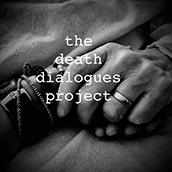The Death Dialogues Project
by Loren Talbot
 The Death Dialogues Project celebrated its 100th podcast episode in August with an interview between podcast founder and “therapist gone rogue” Becky Aud-Jennison and Dr. Mekel Harris, a licensed pediatric and family health psychologist who specializes in grief and loss.
The Death Dialogues Project celebrated its 100th podcast episode in August with an interview between podcast founder and “therapist gone rogue” Becky Aud-Jennison and Dr. Mekel Harris, a licensed pediatric and family health psychologist who specializes in grief and loss.
Like many of the interviews on the podcast, this episode unites two voices seeking to, as Mekel says, “have conversations of the reality of death and living with our own mortality.” This poignant look at the reality of death is echoed throughout Becky’s interviews with death doulas, health care professionals, grief specialists, authors, and many others who have been deeply touched by grief and loss.
Becky, a nurse turned therapist now living in New Zealand, had been frustrated with the institutionalized process around end of life in the United States. When time allowed, she started exploring work beyond her formal training.
One such exploration: theater. She already had an interest in the dramatic arts, but her daughter’s acting practice led Becky to more deeply explore the medium. “My most moving theatrical experience was being cast in The Laramie Project, which is a verbatim play based on the murder of Matthew Shepherd in Laramie, Wyoming,” Becky says. (Verbatim theater is a genre based on real interviews with individuals.) “It was there I learned the power of verbatim, as well as having first-row seats to The Vagina Monologues early after its release.” Seeing these plays also reminded Becky of the work she did as a therapist exploring clients’ personal stories using a structured interview process called Dignity Therapy.
These different strands of her work life came together in 2017 after the tragic loss of her brother to brain cancer, followed by her mother’s death 10 months later. Drawing on the teachings of Zenith Virago, a death walker, she was empowered to help honor her brother’s life by keeping him home following his death. After bearing witness to the care given to her son, Becky’s mother also chose to be kept at home following her death.
As her mentor and confidant, Becky’s brother had always encouraged her activism and self-expression. At the time of his death, Becky was planning on staging The Vagina Monologues, but felt called to shift her focus to collecting people’s experiences around death and grief. The result, The Death Dialogues Project, aims to improve literacy surrounding all things death.
“We are not being taught constructive ways to have constructive conversations about death,” Becky states in podcast episode 98. Her guest Shantell Riley agrees: “We are socially conditioned to believe that death is a total separate event from life. To not allow this to be connected to the life process is such a big disservice. … It allows us to be very ill-prepared to deal with it when it happens.” Creating these conversations is what informs us and allows us to be prepared when death occurs in our lives, as well as giving us room to prepare for our own death. Becky calls her podcast a “grassroots movement with an aim of getting conversations of death, dying, and the aftermath out of the closet and into the light.” Her dedication to deep conversation, diverse interviewees, and a compassionate approach truly does bring light to the topic.
The podcast’s stories are intimate and personal, offering those of us serving in the field continual insight on how people handle death and process grief. Becky’s guests often use their own grief as a launching point for their life’s work. Whether it’s a conversation with Modern Loss founder Rebecca Soffer or pastor and author John Pavlovitz, every episode illustrates how personal loss created each guest’s pursuit of serving as a death educator. It’s a story that’s familiar to many of us, and hearing different voices discuss their own calling better prepares us to serve others. The Death Dialogues Project provides us with access to these stories and connection to the people doing this valuable work.
“The premise is that hearing these conversations is actually a bit of exposure therapy for those downright fearful of death, as well as an excellent resource about what works for people and alternatives surrounding dying, death, and the aftermath,” Becky says. That recipe ensures she delivers on the opening line of each episode: “Listening will make you a better human. Period.”
On September 17, Becky and her new podcast partner, Kate Burns, will release episode 103: “Sharing Solace with Crystal Webster.”
